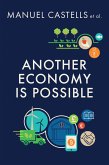Dieser Download kann aus rechtlichen Gründen nur mit Rechnungsadresse in A, B, BG, CY, CZ, D, DK, EW, E, FIN, F, GR, HR, H, IRL, I, LT, L, LR, M, NL, PL, P, R, S, SLO, SK ausgeliefert werden.
'There are many critics of the current capitalist system. And equally many others who profess how to organize it better. What is often missing is a link between the two. That is, an understanding of how we got into the mess we have, and using this understanding to analyse what is required to do better. Kaplinsky's book does just that, bringing together historical, political and economic research in a way that allows us to both learn from history, and to have a more prosperous and sustainable future.'
Mariana Mazzucato, Founding Director of the UCL Institute for Innovation and Public Purpose, and author of Mission Economy: A Moonshot Guide to Changing Capitalism
'If you want to understand today's world and how to fix it, this is the book to read. Kaplinsky shows a formidable capacity to encompass the whole spectrum of today's global problems and provides realistic - though ambitious - solutions. Indispensable reading!'
Carlota Perez, author of Technological Revolutions and Financial Capital: The Dynamics of Bubbles and Golden Ages
'A compelling read, brilliantly written and bubbling with thought-provoking ideas, experience and outlines for the future.'
Sir Richard Jolly, former Assistant Secretary-General of the UN
'Faced with what some describe as extinction-level threats, Kaplinsky dares to say this is no time to despair. With his considerable expertise as a developmental economist, he shows that trying to tick off each problem as it comes along is doomed to failure. Part history, part manifesto, Sustainable Futures calls for an integrated approach which brings together the resources of government and the power of the people. Those who want to avoid the mistakes of the past and re-make our future should read this book.'
George Alagiah, BBC Journalist and Author
'Dedicated to "all the grandchildren", Sustainable Futures is written in the hope of contributing to a pathway out of the current dreadful state of our world and into a sustainable future for them. Kaplinsky provides a theoretical and conceptual framework to better understand the current crises and to extract lessons for the future from epochal moments in history and sets out an ambitious agenda for change. He has indeed provided a compelling and hopeful message "for the grandchildren".'
Keith Bezanson, former President of Canada's International Development Research Centre
'A most inspirational and enlightening book by a leading development scholar and thinker, analysing courses and actions to build an economically, socially and environmentally sustainable future. A book with historical and analytical depth as well as a global and forward vision which is much needed at a moment when the world is at crossroads.'
Xiaolan Fu, Professor of Technology and International Development, University of Oxford
'Read this book! It's tightly argued, packed with an astonishing depth and range of evidence on our current crises, and yet is ultimately equally full of hope and practical inspiration, ambitiously laying out a sweeping agenda for change. Kaplinsky combines the big vision of how society must come to grips with innovation together with the mechanics of driving change.'
Harriet Lamb, CEO of Ashden and former CEO of Fairtrade International
'As the pandemic continues to grip the world, we are facing increasing demands for a more resilient and sustainable socio-economic system. Taking a Schumpeterian perspective, this book offers an effective clue to a way out of the current crisis. While it still sees a window of opportunity in the potentials of information communication technologies, it also sets outs a blueprint for collective action by us. It is a must read for all of us, who should participate in this joint effort.'
Keun Lee, Winner of the Schumpeter Prize, 2014, and Professor of Economics, Seoul National University
'This work is a tour de force by a mature and insightful social scientist, worth reading by anybody concerned with how to tackle simultaneously challenges such as global warming and growing inequality. It explains how the world got into its current unsustainable state and it comes with brave and radical ideas for how to move it back towards sustainability.'
Bengt-Åke Lundvall, Emeritus Professor of Economics, Aalborg University
'Kaplinsky has laid out with clarity, historical perspective and illuminating supporting data just how the current economic picture indicates a turning point in advanced capitalism. Kaplinsky's driving and compelling historical narrative undergirds an ambitious case for political change that is both grounded and hopeful, touching on income equality, environmental resilience and economic development. Sustainable Futures is a serious and highly readable account of our recent economic history and our potential path forward. Informative, insightful and inspiring.'
William Milberg, Dean and Professor of Economics, The New School for Social Research, New York
'A timely and must-read book as the world ponders how to build better. It shows that the age of mass production, with endless harnessing of energy and matter, has resulted in multiple crises of declining growth, the rise of plutocracies and populism, and the ravaging of the environment. Kaplinsky argues that the power of the financial sector and the plutocracy needs to be overcome, in order to realize the potential of the ICT-based techno-economic paradigm to build a more sustainable and environment-friendly system of production.'
Dev Nathan, Visiting Professor at the Institute for Human Development, New Delhi, and Director of GenDev Centre for Research and Innovation, India
'Kaplinsky illustrates the depth of the crises of the twenty-first century. Sustainable Futures distinguishes itself in its interdisciplinary, pluralist, and historical approach coupled with an emphasis on the broader techno-economic paradigm: technological drive, economic development, environmental sustainability, social change and political structure. This timely book is extremely relevant to policymakers and researchers of both the industrialized and developing world.'
Arkebe Oqubay, Senior Minister and Special Adviser to the Prime Minister of Ethiopia, and Distinguished Fellow of the Overseas Development Institute
'Engagingly written and spanning economic, social and environmental agendas in an exemplary way, Sustainable Futures places Information and Communication Technology at the heart of a compelling argument, but never as a technology fix. On the contrary, the book argues convincingly for a wide range of social and political solutions that should provide a much-needed and powerful directionality to the opportunities offered by these technologies.'
Johan W. Schot, Professor of Global History and Sustainability, Utrecht University
'This work provides a careful, historically based, tough-minded but ultimately optimistic agenda for action that could rise to the challenges of the rapidly deteriorating climate and environment, threats to social cohesion, predatory elites, and destructive nationalism. We really can go beyond the fragile and destructive models and paths that we have followed, towards a much better economy, society and way of living. But we must decide and decide now; as the book's final sentence states, drawing on Sartre, "to choose not to act, is to choose".'
Lord Nicholas Stern, co-chair of the Global Commission on the Economy and Climate, Professor of Economics at the London School of Economics and Political Science, and former Chief Economist of the World Bank
'Sustainable Futures is a triumph. Drawing on all the social sciences, it demonstrates how bulldozer trends of our time can be understood as fuelled by the declining phase of the Mass Production "techno-economic paradigm". The book ends with a vision of what an ICT-enabled, more sustainable world could look like. Anybody interested in the future of human - and non-human - society should debate it.'
Robert H. Wade, Professor of Global Political Economy, London School of Economics and Political Science
'The journey from the world's current multiple crises to a sustainable future looks almost impossibly difficult. But in Raphael Kaplinsky we have a guide who inspires confidence. He is that rare thing: an economist who combines a real understanding of society and politics with a seasoned idealism, and in this book he gives us what is perhaps our best chance.'
Richard Wilkinson, co-author of The Spirit Level and co-founder of The Equality Trust
'This is a big book; not in terms of length (it comes in very readable form at just over 200 pages of very well-researched and written argument) but in the role it might play. It is both an excellent and convincing analysis of one of the biggest problems confronting society today and at the same time a roadmap for change.'
John Bessant, International Journal of Innovation Management
'Kaplinsky is surely correct about what needs to be done. [... The book helps] move the policy debate forward by highlighting the social and political sides of technology-based solutions to the climate crisis.'
The Journal of Development Studies
'The "how" aspect of Kaplinsky's book is truly ambitious and visionary, if not simple to operationalize. Although it will be incredibly challenging to attain the synchronized responses that Kaplinsky lays out, it is a worthy task.'
Warigia Bowman & Rhyder Murree Jolliff, Energy Law Journal
"Sustainable Futures accomplishes much of what it sets out to do in providing a hopeful account of how to address the climate crisis. ... Bridging this divide [between popular and academic audiences], especially when it comes to an urgent topic in desperate need of action, should be encouraged and Kaplinsky's attempt lauded."
International Affairs
"A very compelling book with a positive and convincing message. [...] From a well-argued and broad-ranging critique of the mass production economy, Kaplinsky presents an open and heartfelt analysis of the severity and urgency of the junction our economy and society face today."
Lisa De Propris, Regional Studies









